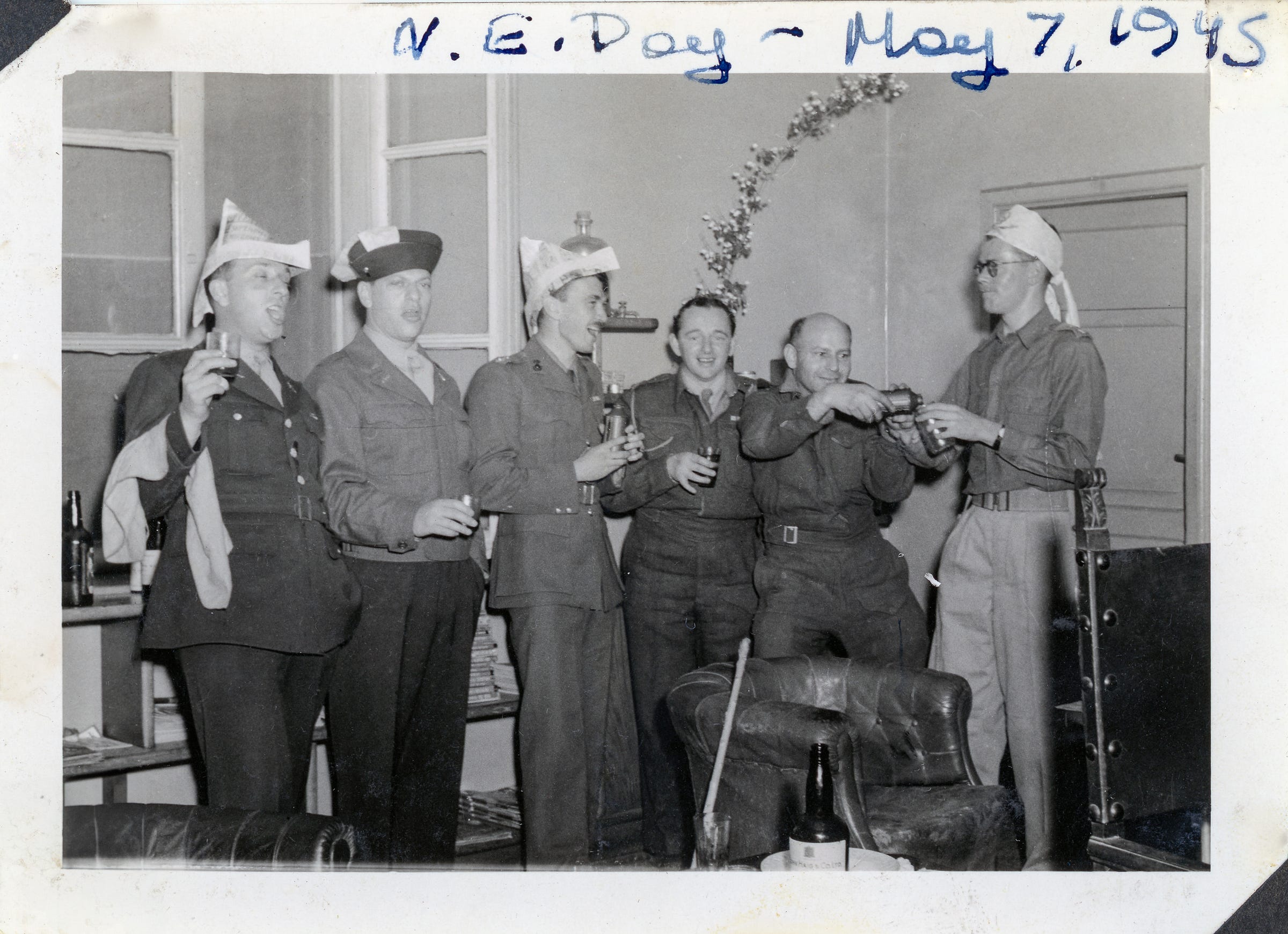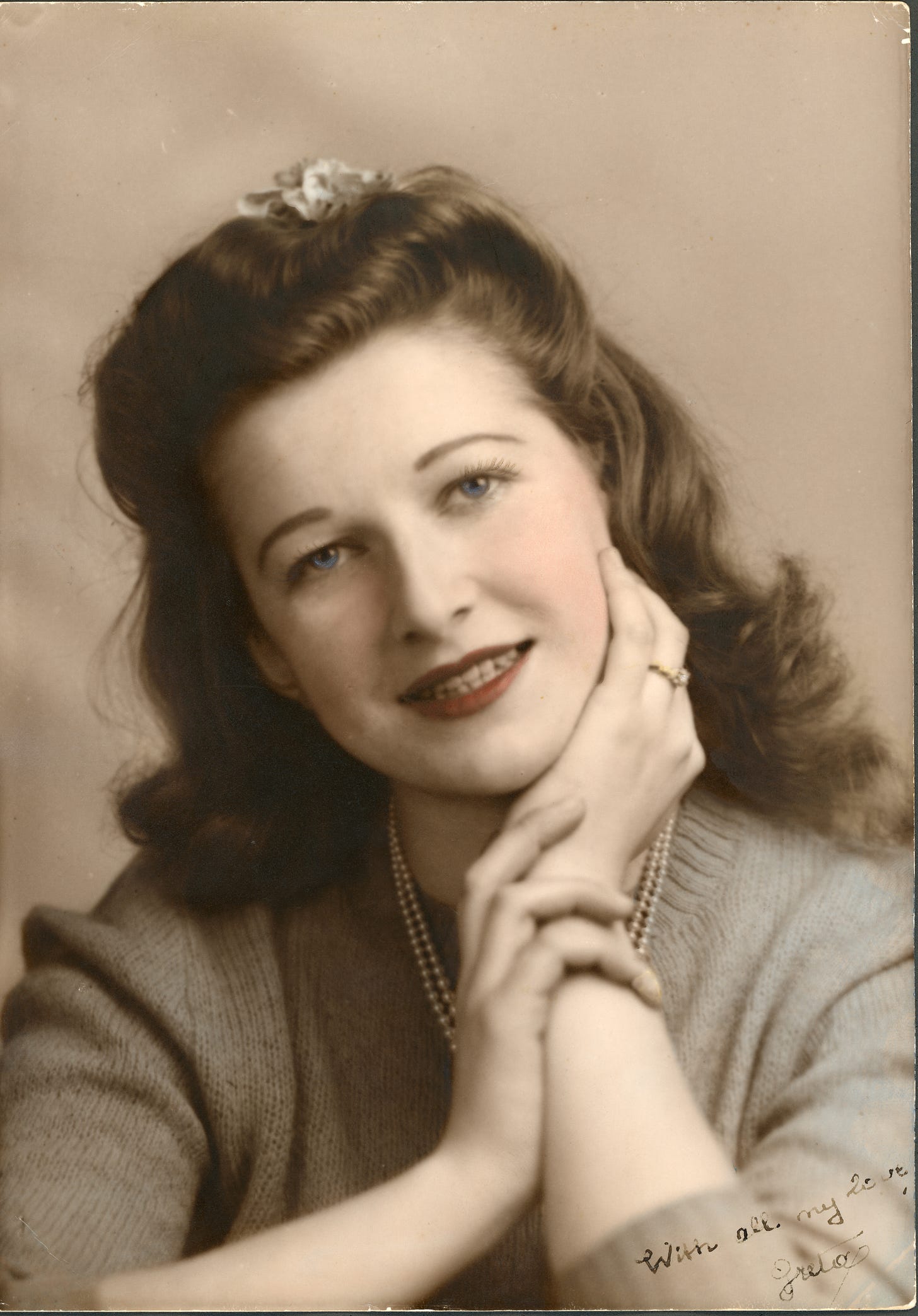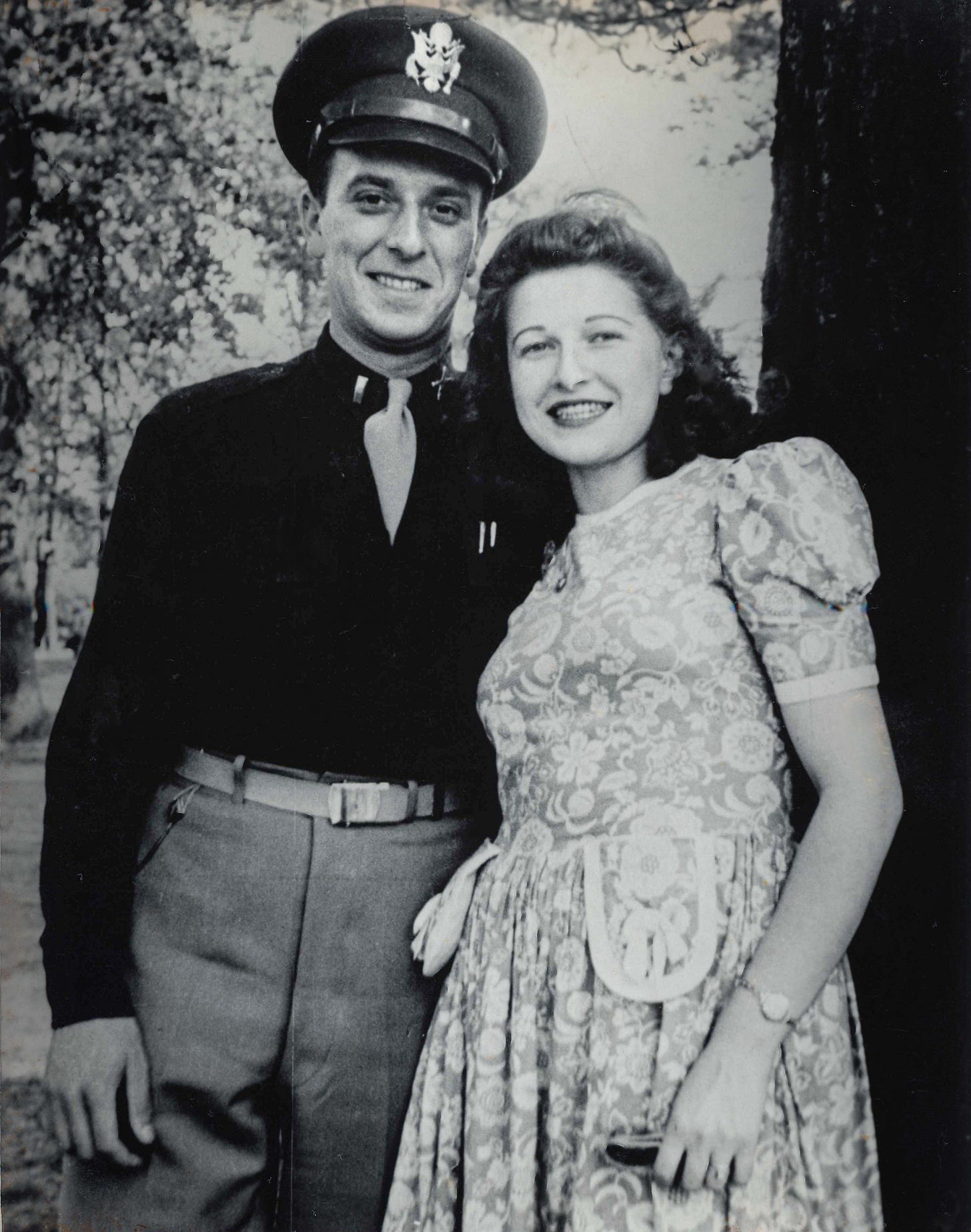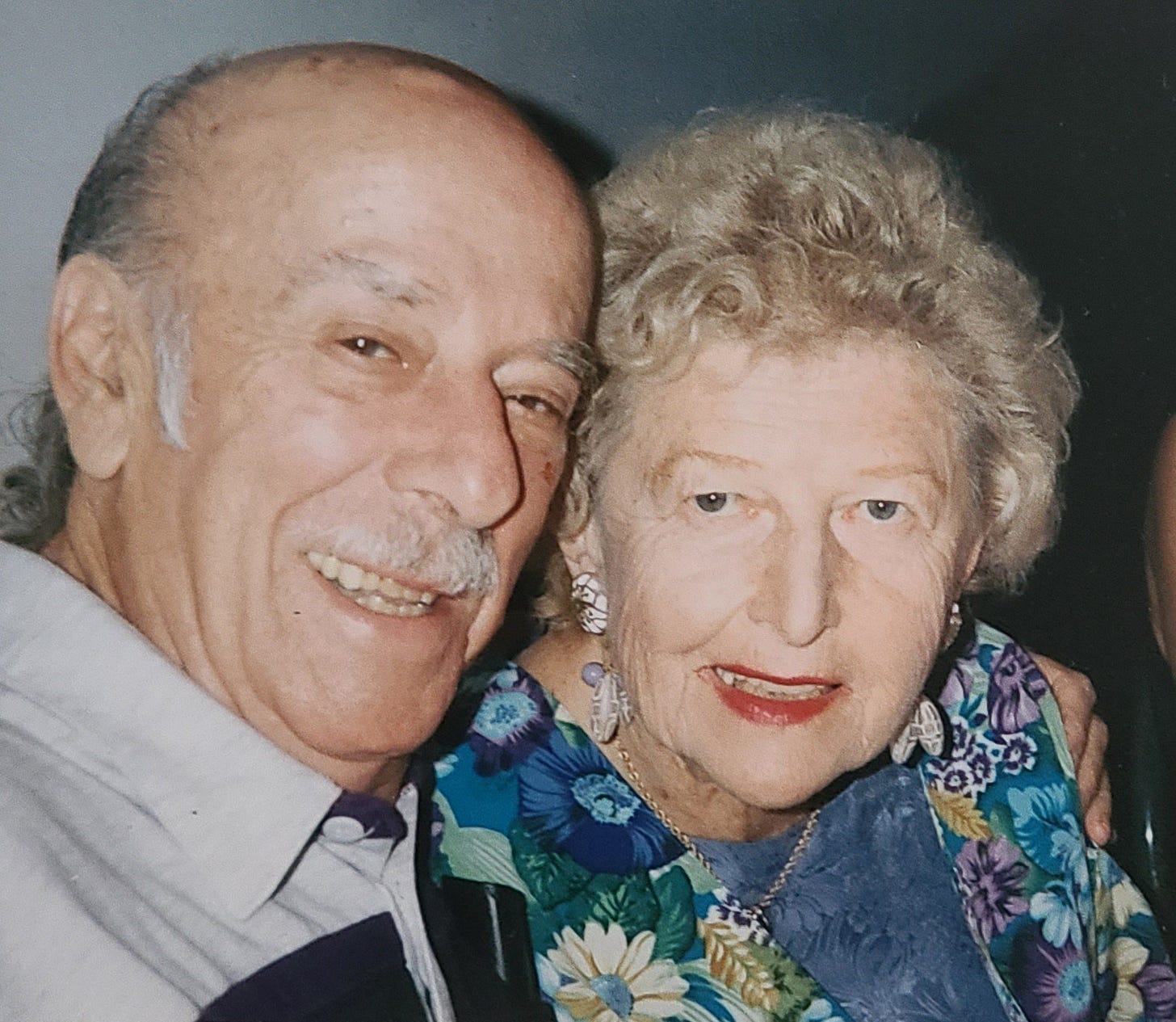Bittersweet: A V-E Day Celebration Photo
A profound juxtaposition between the celebration and irony would form a firm foundation upon which Greta and Norm’s post-war life would flourish. This captures their story of WWII.

Our guest, of joins us for this very special cohort of military memories for the Projectkin Members’ Corner. Explore all of the stories in the Members’ Corner and consider joining us to share a story of your own. Subscribe to Stacey’s publication here:
The Photo
On the back of one of the photos, Norm wrote, “V-E Night Roma,” adding his companions’ ranks, names, and nicknames. On the front is the date, May 7th, 1945, written in what I recognize as my grandmother’s handwriting.
But V-E Day is officially May 8th. So, either the photos were incorrectly dated, or maybe they’d been taken a few hours before the news officially broke across the globe. While I’ll never know for sure, there’s no doubt there was a celebration that seemed to include lots of revelry and drinking.
Until recently, I didn’t realize that this and other remarkable photos were “hiding” among the collection of Norm’s military images that I’d stored in a manila envelope after carefully removing them from the tattered pages of vintage albums. That envelope and the rest of my grandparents’ photos were stashed away in a large wooden box, waiting patiently for me to rediscover and tell their stories.
As I started sorting and properly archiving the collection (scanning, documenting, saving, and backing up), I began to pay close attention to the details. I had seen all these photos before, but now I was seeing them through a different lens.
I’ve never been much of a history buff or a great geography student. The conglomeration of all those facts, locations, and dates always seemed like a foreign language to me. So, it’s not surprising that the significance of these V-E Day photos had slipped by me. But now I urgently wanted to know more about my family, so history and geography would become big parts of my quest.
I learned that in early 1943, following a half-year of graduate coursework in chemistry, Norm enlisted in the Army to serve in World War II. He entered as a 2nd Lieutenant Battery Officer but was quickly promoted to Supply Officer, then Intelligence Officer in an Artillery Battalion, and finally 1st Lieutenant Chemical Officer as an organic chemist.
But there was also something else on his mind as Grandpa Norm prepared for military service.
During Norm’s grad school at George Washington University, he met and fell in love with a classmate, Greta. She was a graduate assistant teaching one of the chemistry courses he was taking. Not only was she a poised, striking beauty with beautiful skin, golden brown hair, and blue-green eyes, but she was also undeniably intelligent and cultured.
As she tells it,
“At first, I was not interested in him. He kept asking me out, and I’d turn him down. But he wouldn’t take no for an answer. He would follow me around campus, trying to get my attention. And he did, but not in the best of ways. He would sing every verse of that horrendous song ‘There’s a hole in the bottom of the sea’1 and annoy the heck out of me. Finally, I told him I’d go out with him if he promised never to sing that song again.”
Victory…he won her heart!
They married on March 31, 1943, in Oklahoma, where Norm had been stationed. By the end of Spring, Greta was expecting their first child as Norm was preparing for active duty. Now pregnant and soon to be alone, Greta moved to Chicago to live near Norm’s parents and have help with the baby. On January 10, 1944, my mom, Linda Rose, was born.
This photo of my grandparents hangs in my entryway. Norm is in his uniform, and Greta is donning a floral dress with a little belly pooch—an early baby bump, so I was told. However, the exact date and location were not documented. So, other than this single image, I don’t know if Norm would see Greta again before returning from Europe.
Norm was deployed abroad as a member of the Allied Forces to help defend against and defeat the evil atrocities of war that led to an estimated “70-85 million deaths including about 21-25 million military personnel and 50-55 million civilians, many of whom died because of deliberate genocide, massacres, mass-bombings, disease, and starvation.”2
From my grandpa’s military record, I learned that he was awarded various decorations for his service, including a European Theater of Operations Ribbon (2 battle stars), an American Theater Ribbon, an Asiatic-Pacific Theater Ribbon, a WWII Victory Ribbon, and a Meritorious Service Unit Plaque.
As I continued studying the photos of my grandpa celebrating on V-E Night, I imagined that he and his comrades must have been ecstatic that Germany surrendered. They would soon return to their family, friends, and pre-war lives. And for him, that also meant meeting the toddler daughter he’d only seen in photos. I remember my grandma telling me how my mom cried and cried when he first came home because she didn’t know who this strange man holding her was.
But suddenly, the gravity and irony of this moment dawned on me, not just in our collective history but also in my grandfather’s.
Like many couples, Norm’s “victory” in love with Greta began on a college campus, but had it not been for the unrest and upheaval in Europe, their paths never would have crossed.
Greta had only been in the United States since 1939, when she emigrated from Austria after the Anschluss3 and Kristallnacht.4 Before the Anschluss, she was a second-year medical student at the University of Vienna. It was only because of the war that she was in America and would ultimately meet and marry Norm.
Greta’s younger sister also escaped Austria and emigrated to the United Kingdom (and later to the US). Sadly, their parents were not as lucky and perished in a Polish concentration camp after being transported from a ghetto in Opole.5 From records, it is believed that they were killed in early 1943.
The Bittersweetness of Victory
On that historic day in May 1945, Germany surrendered its armed forces, and an end was declared to World War II on the Eastern European front. Certainly, it was a time for a victorious celebration.
But, looking at my grandpa’s photos, I sensed the profound juxtaposition between the celebration and irony in the moment captured on film. Because of the war, my grandfather had met the love of his life, and honorably served in the Allied Forces. Though he helped to defend his country, the enemy murdered his wife’s parents. He’d never get a chance to meet his in-laws.
Though these dichotomies would occasionally cast a dark shadow on their lives, Greta and Norm turned them into a strong foundation they could build on to raise a family and where their post-war lives could flourish.
Four years after the war, they welcomed a son and continued building a complete, adventurous, and active life filled with family, friends, and eventually three grandchildren. They were lifelong companions, married for over 50 years, and they meant the world to me.
Just three weeks after Norm died in 1995, Greta passed from inconsolable grief and a broken heart. They were genuinely inseparable… a “Victorious Love,” born from a world war and a “hole in the bottom of the sea.” Theirs was an enduring devotion and dedication to each other.
Explore more stories in our Members’ Corner. Be sure not to miss the month's new releases focused on memories of family members who served in the armed forces worldwide.
Share your thoughts and memories in the comments. Tapping “Restack” and mentioning our author, shares this piece with your followers. As a bonus, it thanks Stacey and helps us get the word out about Projectkin. Thank you! ~Barbara
Hear a recording of the song from the King County Library System kcls.org/content/hole-in-the-bottom-of-the-sea
Wikipedia detail on WWII casualties: en.wikipedia.org/wiki/World_War_II_casualties#:~:text=World%20War%20II%20was%20the,of%202.3%20billion%20in%201940
Background on Nazi territorial aggression in the Anschluss: encyclopedia.ushmm.org/content/en/article/nazi-territorial-aggression-the-anschluss
Background on Kristallnacht: encyclopedia.ushmm.org/content/en/article/kristallnacht
The European Holocaust Research Infrastructure project (EHRI) captures the tragic stories sent as messages by Jewish deportees: blog.ehri-project.eu/2019/01/22/messages-from-the-ghetto











What a love story! Thanks for sharing it.
Beautiful story!